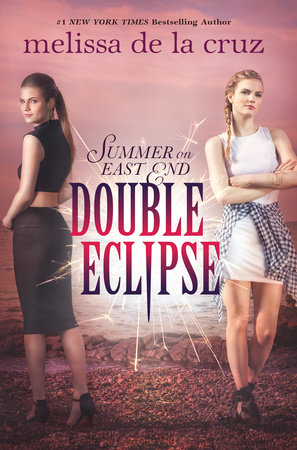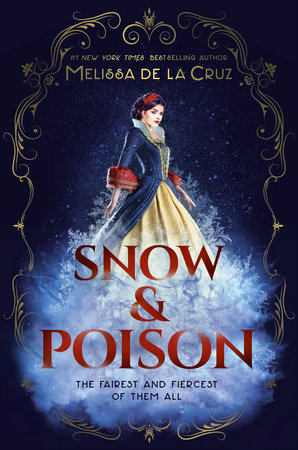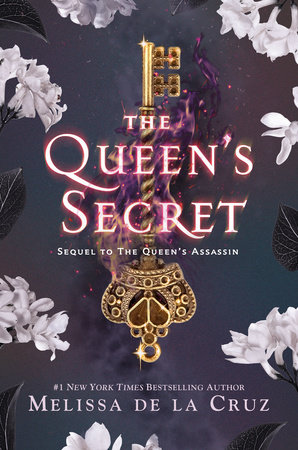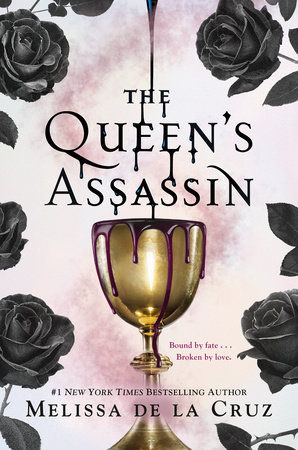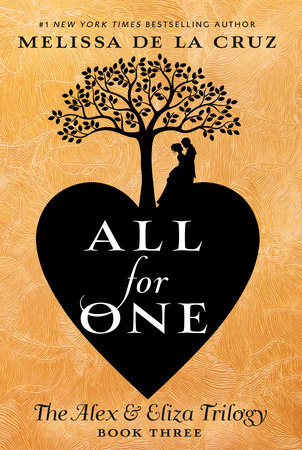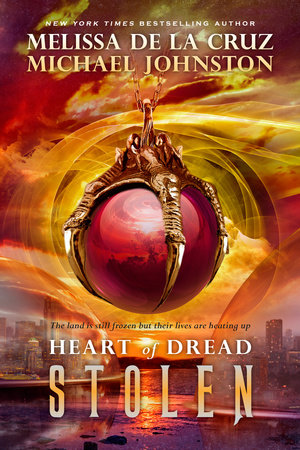
Triple Moon
Part of: Summer on East End
After they cause a terrible accident at their old high school, twin witches Mardi and Molly Overbrook are sent to live with their “Aunt” Ingrid Beauchamp in North Hampton, on Long Island’s mist-shrouded East End. Because the twins cannot control their powers, their father begs Ingrid to tame them over the summer, before the White Council exiles the girls to Limbo.
Trouble continues to bubble and boil when the girls meet the younger Gardiner boys, who are just as handsome and sexy as their older kin. But all is not as it seems. As Ingrid helps the girls learn to control their magical impulses, Mardi and Molly have just this summer to figure out how to grow up, how to love, and how to be a family.
- Pages: 368 Pages
- Series: Summer on East End
- Publisher: Penguin Young Readers Group
- Imprint: G.P. Putnam's Sons Books for Young Readers
- ISBN: 9780698188280
An Excerpt From
Triple Moon
Copyright © 2015 Melissa de la Cruz
FADE TO BLACK
Even by Manhattan private school standards, Bret Farley’s party was unforgettable. It wasn’t just the bottomless flow of top-shelf liquor or the mounds of gleaming caviar, the world-class sculpture collection and the spectacular views of the city from the Park Avenue penthouse, or the rumors of a hidden elevator down to a clandestine indoor lap pool of black marble. It wasn’t the designer drugs or the thousand-dollar stilettos. It wasn’t all the fooling around in gilt bath- rooms and between silky Italian sheets.
The night of Bret Farley’s party was unforgettable because, by the end of it, two of the guests were dead.
The prime suspects behind this tragic turn of events, the Overbrook twins, Molly and Mardi, had arrived at Bret’s penthouse a little after ten, bewitchingly identical in their dark features and lush black hair, but oh so different in style. Molly was the height of chic, Mardi the essence of rebellion. Equally gorgeous and equally brilliant.
So why, only moments after taking their first drinks from a caterer’s silver tray, did both goddesses start to feel undone?
Molly was sipping champagne, Mardi a very dry Manhattan. This they both remembered. They also remembered that blue-eyed, ultra-suave Bret had flirted with both of them, telling Molly the vintage bubbles and caviar were all for her benefit, then leading Mardi by the hand among the bronze legs of the enormous Louise Bourgeois spider, the crown jewel of his family’s collection. The only other of that size graced the lobby of the Tate Modern in London. The twins recalled the body of the spider looming in the apartment’s vast entryway, beautiful and malicious.
Each sister had been glaringly jealous of Bret’s attentions to her twin. But neither one could begin to remember where those attentions had led.
There was an obscene swirl of luxury: reflective surfaces, sparkling views, high art, thumping music, and shiny beautiful rich kids who were striking poses for their Insta accounts, gossiping, drinking from priceless crystal, and falling down wasted onto one another.
The Overbrook girls were very much a part of this ruling scene, but they were apart from it as well. Because Molly and Mardi weren’t simply pretty and privileged; they were supernatural.
With supernatural instincts.
The twins could tell that something was up that night, something more than just Upper East Side private school mischief, but they found themselves too spellbound to investigate. Was it in their drinks? Or a deep corruption in the atmosphere? If you’d asked them at the party if they thought it would end in carnage, they would have laughed, but not wholeheartedly. They would have let out tinkling, nervous laughs. Laughs that admitted suspicion. But suspicion of what? Of whom?
The last thing Molly remembered, before blacking out, was the sound of Bret’s sexy whisper in her ear. “This is all for you, Molly,” he was saying, “every flower petal, every flute, every ivory caviar spoon.”
Only she didn’t want to believe him because she had just seen him with her twin, probably telling Mardi the same thing.
The last thing Mardi recalled was the bronze under- belly of the giant spider. Bret was telling her it was called Maman, because the artist believed that spiders were protective and benevolent. “You’re the only girl here who could possibly get the reference,” he whispered. His arm rested on her shoulder. “You love spiders, don’t you, Mardi?” She managed to say, “Yeah, spiders are cool,” and then her memory went blank.
The next morning, the legendary Overbrook twins stared at each other across their kitchen table through raccoon eyes. Neither one had taken off her mascara. They were still in their rumpled party clothes. Molly in her cocktail dress, Mardi in her torn black jeans. Some- how they had managed to order coffee and eggs online from the diner down the street.
They were too spent to start their usual argument about whose fault it was that the eggs were over easy instead of sunny-side up and who had been stupid enough to order whole wheat toast instead of sour- dough. Somehow, there was no energy for fighting.
When they finally managed to speak, they sighed, in unison, “What happened last night? What the—?”
Then they sank silently into their breakfast, each straining to remember the previous night.
It was several hours before they got the news.
PART ONE
HOT FUN
IN THE SUMMERTIME
THRIFT SHOP
Mardi Overbrook shifted into fourth gear on the Montauk Highway, gunning to pass what had to be yet another banker’s kid in a brand-new black Ferrari. She
belted along to Macklemore, singing about the twenty dollars in her pocket, her car vibrating to the powerful beat as it dusted the ultimate Hamptons douchemobile. Sucker had probably paid extra for automatic because he never learned to drive stick.
Her own car was a Ferrari too, but it was far from new—a 1972 red convertible Daytona that had lived many lives. It didn’t look anything like Banker Boy’s car, and she didn’t look anything like his preppie girl- friend either. Mardi had a rainbow tattoo that circled her neck like a python and an emerald-studded barbell through the tip of her tongue, which she stuck out at the astonished driver as she blurred by him, screaming along to her favorite song.
At the light, she glanced down at her phone, which was sitting faceup on the ebony leather passenger seat. Her social media feed was flowing in a steady stream, showing the streets and interiors of the city she was leaving behind. Unlike the majority of the stuck-up kids at her stupid prep school, she wasn’t getting the posts of sunsets in Mustique or cocktail parties in Nantucket. No, her feed was full of the real stuff from after-hours clubs all over the five boroughs of New York City, places without names or defined locations, places that appeared and disappeared in water towers and in abandoned fleabag motels, places she called home be- cause she traveled there in a manic rebel pack that she called family. The pictures were of passed-out teens, teens staggering out into the daylight like disoriented moths, teens in various states of undress. She smiled down as they migrated across her phone screen. Her tribe.
She adjusted the strap of her vintage leopard-skin push-up bathing-suit bra, which she was wearing with a pair of threadbare rhinestone-encrusted denim shorts. The outfit had been left decades ago in the back of a closet by one of Dad’s girlfriends from his Studio 54 days. There was great stuff to be pillaged from Dad’s past in the Overbrook loft in Greenpoint—if you knew where to look.
Mardi grabbed the phone, puckered her lips, and took a quick close-up, posting it for all her friends back in the city with a tagline: “Don’t you dare forget me while I’m gone.”
Why in the Underworld was she leaving her life behind? Could someone please remind her?
Oh, yeah—she was leaving her life behind to spend the summer babysitting in a sleepy town lost some- where on the East End of Long Island. With her princess of a twin sister, Molly, no less.
It was a fate worse than being badly dressed.
As she drove farther out from civilization, the land- scape grew more pastoral and the salt smell in the air grew more pronounced, irritating her eyes so that she started to tear up. She was not one to cry, but this summer stretching ahead of her, an endless ribbon of small-town boredom, was a depressing prospect. She hadn’t even arrived in North Hampton, and she already felt trapped.
Mardi Overbrook hated feeling trapped.
She gritted her teeth, shifted into fifth gear, and turned the music up, determined not to admit defeat. If she was going to live for the summer in North Hampton, then she was going to make North Hampton worth living in.
A post popped onto her phone, which she instantly knew was from her twin. Not only because it was a phony artistic shot of some sand dune, complete with endangered shrubs and a pensive-looking seagull, that Molly had surely stopped to capture along her route— typical pretentious Molly—but because of the pink gold ring rolling over the image, undulating like soft taffy across the screen.
This was what young witches did lately to wink at one another through cyberspace. They overlaid their static posts with moving images visible only to their kind. Everyone had a symbol, like a living emoji. There were waxing and waning moons, twinkling stars, beat- ing hearts, all sorts of romping mythical creatures. It was a tribal thing. And tribes were the whole point of social networking, right?
Molly and Mardi always had the rose gold ring, subtly carved with a diamondback pattern, floating through their posts, but only the two of them could see it. They had other images for sharing with the general witch population. Mardi used a vaulting rainbow, Molly a galloping thoroughbred horse. Only to each other did they make the golden ring visible. They’d never talked about it. But that’s how it was.
So, when Mardi sent the image of her red lips out into the world, Molly alone would notice the symbol of their sisterhood floating across the screen, while the rest of Midgard’s witches saw a snaking rainbow and the general population saw nothing but a cherry-red pout and a hint of leopard and lace.
Normally, this notion that she shared something unique with Molly wouldn’t faze Mardi. It was no big deal, a stupid twin thing. But today she had to admit that she found it just a little bit comforting that, as she left the known world, there was someone—even if that someone was the most irritating person in the universe—who was truly on her wavelength.
The phone rang, and her father’s handsome face filled the screen. She turned the music down and intinctively slowed, as if he could see her, although she was still twenty miles over the limit.
“S’up?”
“How about ‘hello, Dad’?” Troy Overbrook asked. “S’up?”
“Are you almost there, my sweet?”
“Honestly, I have no idea. The GPS is acting weird.” “Well, can’t your sister navigate for you? I told you it was tricky.”
Mardi looked at the empty seat beside her. “Molly’s right here, but I’m afraid she’s fully occupied painting her nails a lovely shade of lavender and simply cannot be bothered to come to my aid, Your Majesty. So sorry, Your Highness. At your service, My Lord. Deferentially yours, Master. Is that what you want to hear?”
Troy sighed. “Well, at least you girls are together. And what I want to hear is that you are both going to take this summer with Ingrid seriously. She’s an old, dear friend of mine, and I’m afraid she may be our last hope. Show her some respect. Take good care of her children. I’m asking you to try. For your own good.”
“I still can’t believe you’re making us do this—for the whole summer!”
“Do it you will. You have no idea how ugly things will get if you blow it.”
“Life is an ugly thing, Dad.”
“Not as ugly as Hell, my sweet.”
A flashing red light appeared in Mardi’s rearview mirror.
“Dad, gotta go. I’m being pulled over.”
“What?” There was a groan on the other end. “Okay, but I want you to promise me that there will be no funny business. Take it like a mortal. A mortal who deserves a speeding ticket. I’ll pay the fine. You have got to learn some self-control.
”
“Okay, promise, Dad. I swear. Okay. Bye.”
She hurled the phone onto the floor and downshifted to a perfect stop. Before the police officer could open his door, she had already appeared between the exhaust pipes of her ridiculously powerful cherry-red car.
Her hair was jet black and knotty. Her eyes were dark and defiant, her makeup artfully smudged. Her legs were endless, sprouting pale and willowy from a pair of gladiator sandals covered in bronze spikes. The effect, with her studded shorts and pointy leopard bra, was quite unnerving. Her stomach was so defined and her arms so ripped that she looked hard to the touch, both wildly attractive and severely off-putting at the same time. The green glow emanating from the precious stone studding her tongue gave her the hypnotic quality of a cobra.
“Young lady,” said the cop as he stumbled from his car door, “you should remain in your vehicle.”
“Noted for next time.” She laughed, squinting at him until he stumbled again.
“Next time, I will remain in my vehicle. Promise.” Control her powers? Seriously, Dad, what were powers for?
“Next time?” he slurred. Then, making a super- human effort to get ahold of himself, he said, “License and registration, please.”
“Say ‘pretty please.’”
“Pretty ple—wait a second, you’re not old enough to be driving a car like this!”
“I’m sixteen. Last time I checked that was the legal driving age.”
“License and registration,” he repeated, making his syllables yawn in slow motion. Then he said it again, way too fast, three times over, in a high, squeaky cartoon chipmunk voice: “License and registration! License and registration! License and registration!”
“Officer”—she grinned and took a step toward him— “are you harassing me?”
He looked down at his shiny black beetle shoes and clenched his fists, attempting one last time to get a grip on himself in the presence of her overwhelming magic. “Miss, you were going over ninety miles an hour in a fifty-mile-per-hour zone. License and registration.” This time his voice sounded as though he were underwater.
Gleefully, Mardi watched him close his mouth for fear he would start blowing bubbles. This was one of her favorite tricks to play on authority figures: to fill
their mouths with so much saliva that they became terrified of becoming human soap-bubble wands.
“My speedometer told me I was right at the limit, Officer,” she said sweetly.
He made a sound, but his lips wouldn’t part to form words.
She laughed and hopped effortlessly back into her car.
“I’m afraid,” she said as she revved the engine, “that you and I are going to have to agree to disagree, Officer.”
She left him standing stock-still by the side of the road. She had made sure he wouldn’t move a muscle for five minutes and that his memory of the encounter would be as fuzzy as a fading dream.
Sorry, Dad.
Why be mortally weak when she was immortally gifted?
She was the daughter of Thor, after all.
FANCY
As she made out with Leo Fairbanks in the back of an Uber limousine, Molly Overbrook not so surreptitiously checked her phone over his muscular shoulder. Her feed was flying with the jet-set frenzy that always marked the beginning of the summer season. Her friends were posting from private seaplanes as they hopped between St. Maarten and St. Barths, from yachts in Newport and from villas on Lake Como and the Côte d’Azur. Each image sent a current of jealousy coursing through Molly’s gorgeous frame. She hated her “friends.”
Molly was not headed anywhere remotely cool. Quite the contrary, she was on her way to the sleepiest town on the Eastern Seaboard. To babysit. And to get lectured by some old lady friend of Daddy’s named Ingrid Beau- champ about how not to abuse her magic.
Whatever. She had never felt quite this indignant before. Life was totally unfair.
The most galling picture on her feed showed a clique of bikini-clad vampires from Duchesne, a rival Upper East Side prep school to Headingley, where she and Mardi had just finished a disastrous but wickedly amusing sophomore year. The Duchesne vamps were arrayed on a white-sand Caribbean beach, brandishing exotic cocktails, each of their bodies a gleaming perfection.
Vampires could eat whatever they wanted and not put on an ounce. The famous Blue Blood metabolism. A bunch of social X-rays. Not so with witches. A witch could get as flabby as a mortal if she let herself go. There was no justice on this Earth.
Molly unlocked her glossy lips from Leo’s mouth and sighed.
“What?” Leo pulled a few inches away and looked into her dark eyes. He was the hottest guy of a certain set in all of New York City, on his way to his summer home in East Hampton.
When she and Mardi had a fight this morning about Mardi’s insisting on driving to North Hampton in that ridiculous old car, which had no trunk—i.e., no room for Molly’s three giant Louis Vuitton suitcases—Molly went into one of her huffs and tapped out an order for an Uber limo. After, she texted Leo and offered to drop him off at his house on Lily Pond Lane en route, ostensibly so he wouldn’t have to take the train but mostly because the idea of being alone with her thoughts in a car for three hours was unbearable.
Of course, Leo, varsity tennis champion at Heading- ley, jumped at the chance. With her luxuriant dark mane, mesmerizing dark eyes, willowy curves, vertiginous cleavage, and impeccable style, no one could resist her. And she and Leo had been dating on and off all spring, although her interest was waning pretty hard.
Boys were like shoes. Once you owned them and had worn them out once or twice so that all your friends had seen them and done their oohing and aahing, the high was pretty much over. Leo was smoking cute, but he was last season’s catch. You might hold on to a guy like him for a while just because he was high quality. But, once the thrill of the conquest was gone, it was time to go shopping again. You’re never that psyched about a pair of scuffed shoes, now, are you?
At this image of worn-out shoes, Molly crinkled her upturned button nose. She would never understand how her sister wore those ratty, smelly used clothes. What was Mardi trying to prove?
As if summoned by the negative thought, a post from Mardi popped onto Molly’s screen, a shot of Mardi’s pucker in that cherry-red lipstick she liked, along with a strap of that leopard-print bra she’d filched from some skanky old flame of Dad’s. So gross. Mardi had written a whiny comment asking her low-life crowd not to forget her over the summer. Pathetic. By the end of the summer, most of Mardi’s so-called friends would have overdosed or been shipped off to rehab. There would be no one left to remember her anyway.
Despite her irritation, Molly couldn’t help but feel a little bit comforted by the sight of the phantom rose gold ring drifting over her sister’s mouth, the ring that she alone could see. The twins shared a secret language that might come in handy in the boonies of the East End. At some point, they just might need to shore each other up.
She fiddled with the ring on her finger, the physical model for the image that drifted secretly across the twins’ posts. The ring was warm and luminous, its diamond-shaped grooves pleasantly worn, like a kind old woman’s face. She and Mardi passed the ring back and forth between the middle fingers of their right hands. The exchange was almost unconscious and totally peaceful. In every other aspect of their lives, from who got the most cereal in her breakfast bowl to who got to control the playlist at a party to which girl got more of Daddy’s attention, the twins were viciously competitive. “It’s not fair!” was their constant refrain. But when it came to the ring, which they had shared for as long as they could remember, there was simply no issue. It drifted between them. And they had a tacit under- standing that one of them would keep it at all times.
Frustrated with Molly’s distraction, Leo checked out her phone too. “Wow,” he said. “Is that Mardi? She looks hot!”
Spiked with jealousy, Molly pulled him closer and kissed him harder.
“Whoa.” He laughed, enjoying her passion after such a tepid make-out session earlier. “I’ve never seen you take anything so personally.”
Molly refrained from replying, locking him in a rage- infused kiss instead. She jammed her tongue down his throat and kept it there until the limo pulled up in front of his family’s ten-million-dollar vine-covered house.
Feeling confident that she had erased any impression her sister might have made on her boyfriend, Molly waved him off. He stumbled onto his vast lawn, racket bag slung over his shoulder, and in an instant, he crumpled under the bag’s weight. She watched, cackling to herself as he squirmed in a helpless puddle, gradually going still. Someone would find him in a few hours and assume he was wickedly hungover. He would remember nothing.
Causing silly boys to black out was a favorite sport of Molly’s.
As the limo glided back toward the Montauk High- way, she put her headphones on and scrolled through for her go-to song. Over the blasting music, she yelled to the driver that she hoped he knew where they were going, because she herself had no idea of East End geography. All she had was an address.
He said the GPS wasn’t showing him the place exactly, but he was sure they would find it.
She shrugged. She wasn’t in any hurry to greet her oppressive fate.
Why was Daddy doing this to them? Why was he so intimidated by the White Council? If the Council wanted to punish her and Mardi, they would have done so already. But Daddy was convinced that, this time, after the havoc they had wreaked on Headingley Prep and the wild accusations flying in all directions, things would be different. If Molly and Mardi didn’t shape up and start to use their magic “responsibly”— yawn—Daddy feared they would be hurled into Limbo or some such ridiculous thing. But he was wasting his time worrying. And, worse, he was wasting their precious summer by banishing them to North Hampton, because she and her sister were never going to change their ways. No one could make them. There was no point in trying.
Molly belted along with Iggy Azalea as the green of the Montauk Highway started to give way to the gold of undulating sand dunes. She scrolled down her posts, looking to see if anyone had “liked” the photo she had taken earlier, when it had occurred to her that she should put up something tragic and artistic about her upcoming fate, a tableau of nature to be followed by radio silence. Make them wonder.
She’d told the driver to pull over for a minute, teetered out onto a dune in her stilettos and snapped a shot of a seagull. She hoped Bret Farley would be intrigued, but so far there was no indication he had seen it—no “likes” no “favorites.”
Why did she care whether or not Bret saw her post? She repressed an image of his ice-blond hair, blue eyes, and sharp cheekbones, wanting to banish him from her mind like last year’s platform shoes. But his memory was haunting her—perhaps because he was the one that got away? Bretland Farley was the ultimate pair of designer stilettos that were all sold out in her size.
For a while she pouted in silence. Then she put her headphones back on.
As the limo eased into a sudden bank of fog, the bright day grew misty and strange, and Molly grew uneasy about what lay before her.
“Are we almost there?” she whined.
She couldn’t hear the answer to her question because her ears were suddenly ringing with a full orchestral sound. It was a total rush. She recognized it as the theme music for some famous movie that Daddy was into. Apocalypse something. While the orchestra gal- loped forward, louder and louder, she envisioned helicopters and exploding bombs. She was carried away from the moment in a thrilling fever vision.
Then it was if her soul had been deposited on the other side of a dream. The sky was bright again, every- thing was calm, and Iggy was rapping again, boasting about how fabulous she was. Molly knew the feeling.
“We made it,” the driver chirped with palpable relief as they passed a welcome to north hampton sign.
They drove through peaceful fields of corn and potatoes, a peach orchard. There were quaint farm- houses that probably weren’t air-conditioned, a shabby bar called the North Inn, and some beachside restaurants advertising local fare on chalkboards. There was no frozen yogurt, no Starbucks. Molly looked desperately along the road for any brand names she might recognize. At this point, she would have settled for a Duane Reade pharmacy. But there was nothing. She was going to wither and die here.
Her feed had stopped. It was just as Ingrid had warned in her email: North Hampton was not wired for social networking—no Facebook, no Tumblr, no Twitter, no Snapchat, nada. You could text and email here, but that was about it. When you came to North Hampton, your whole being was immersed in the actual place, rather than scattered throughout cyber- space. “In some ways,” Ingrid had written, “North Hampton is outside of time. It is the perfect place to reflect.”
At the very moment that Molly’s limo pulled up to a beachfront colonial house, freshly painted robin’s egg blue, with a saltbox roof and white gables, Mardi’s idiotic Ferrari screeched to halt in the unpaved drive- way. Molly waited for the dust to settle before she nodded to her driver to open her door. She didn’t want to ruin her Prada shift. She couldn’t imagine that this town boasted a decent dry cleaner.
Molly surveyed the front yard: a swing set, a dome- shaped jungle gym, and a huge vegetable patch. Then she turned her eyes to her sister.
The twins emerged tentatively from their respective vehicles.
“Nice ride,” they sneered at each other in unison.
AMERICAN PIE
Something about the little family that rushed out of the pretty gabled house in welcome made Mardi wistful, but only for a second. She quickly remembered she had no desire to be here, and no desire to like these people she was stuck with.
She recognized Ingrid, a.k.a. Erda, from old pictures of Dad’s, since witches don’t age unless they choose to (they had that on the vampires at least). She was fair and slender in a flour-dusted red apron tied over a blue eyelet sundress. Her blond hair was swooped into a loose bun.
Ingrid’s daughter, who looked just like her except for two missing front teeth, was also wearing a red apron. In her case, though, the flour was everywhere. The poor kid’s hair was practically white.
The mortal next to Ingrid had to be her husband, Matt Noble. He was very fit, handsome, with salt-and-pepper hair and chin stubble. He held a squirming towheaded baby who was wearing nothing but an unbleached diaper. When the baby started to fuss, Matt began to curl him up and down like a bar- bell, eliciting delighted squeals.
Mardi forced a smile. Playing house with a mortal might be fun for a few years. But eventually, Ingrid was going to watch him age, drool, and die, Mardi said to herself, with the wicked sensation she derived from seeing insects splatter on her windshield. Beneath her evil glee she felt an undercurrent of sadness.
“Welcome to the East End!” Ingrid hugged each girl, while Matt stopped his antics with the kid long enough to reach out and shake their hands.
“I bet you can tell that Jo and I have been baking.” Ingrid gestured happily to the little girl’s flour-covered hair. “We’ve just put two pies in the oven. I hope you like pie.”
Mardi nodded slowly. “Sure, I like pie.” She had never met anyone who actually baked. Or cooked for them- selves, for that matter.
Ingrid seemed to know what the girl was thinking. “You probably don’t get to do a lot of cooking with your father in New York, what with all the restaurants he likes to go to.”
“I don’t think Dad knows how to turn on the stove in our kitchen. We either go out, eat cereal, or get takeout.”
“You won’t find any takeout in this house,” Matt chimed in. “My mother-in-law, Joanna Beauchamp, who is still in charge of the place even from beyond the grave, wouldn’t hear of it.”
Ingrid laughed and squeezed his arm. “My mother equated eating takeout with being depressed,” she said, quickly adding, “But, of course, everyone has a different perspective—and different circumstances.” Obviously, she didn’t want to seem critical of the twins’ bachelor lifestyle right off the bat. “Come in. Come in.” The house was more spacious and hip inside than one would expect. Walls had been knocked down to create an open kitchen and living space. The wide-planked wooden floors were painted white. The furniture was midcentury modern mixed in with some Italian leather pieces and a smattering of well-chosen antiques. Windows had been enlarged to create great pools of light.
Mardi, who had been envisioning an overstuffed French Provençal nightmare, was palpably relieved. Glancing at Molly, she could tell her twin felt the same.
Matt noticed them looking appreciatively around and explained that his architect brother had helped them remodel the place when they moved in ten years ago.
“And the spirit of Joanna Beauchamp didn’t mind all the changes?” Mardi quipped.
Not at all, Matt said. Joanna herself had been a com- pulsive remodeler and redecorator. She believed houses were alive and should always be evolving. It was only where home cooking was concerned that she was a deep traditionalist.
Speaking of which, thought Mardi, the pies were starting to smell amazing.
Matt offered to take Jo and Henry on a walk to give Ingrid and the girls some time to get to know one another.
As soon as he and the kids were gone, Ingrid shifted her tone slightly, becoming more serious, piercing almost. Before the twins knew it, they were sitting side by side on a white leather sectional, holding glasses of herbal iced tea full of lemon wedges. Ingrid faced them, ramrod straight, on a chocolate-brown ottoman. “Girls,” Ingrid began, “your father sent you to me because he is worried about you. Thor—I mean Troy— is one of my oldest friends, we’ve known each other for years, give or take a century here and there—and I’ve promised him I would try to help you learn to use your magic.”
Molly interrupted her, “What I don’t get is why Daddy doesn’t want to deal with us himself. What’s he doing that’s so important that he has to, literally, farm us out? Commercial real estate deals in Brooklyn?”
Mardi glared at Molly, willing her to shut up. It would be so much smarter in this situation to fly under the radar than to be confrontational. This wasn’t some mortal moron they were dealing with. This witch was as powerful as they were, if not more.
Ingrid seemed unfazed by the interruption. “Troy tells me you are completely out of control, that you are hexing and wreaking havoc out in the open all over New York City, and that there was even a certain fatal situation among your classmates. I understand the White Council is threatening to send you to the Under- world, pending the results of the mortal police investigation. If anything like the Salem witch trials occurs in Midgard again, we could all be punished.” She let that sink in. Mardi squirmed and felt Molly doing the same next to her.
Mardi didn’t want to think about what had happened just a few weeks ago. The accident on the night of that half-remembered party at Bret’s. The fatal one that Ingrid had just mentioned.
“Listen, the Council could reimpose the Restriction of Magical Powers that we suffered under for centuries before it was lifted only ten years ago. Every one of us could be condemned to a life in the shadows. And you two could be banished forever to the Kingdom of the Dead. Am I making my point?”
The girls looked at her blankly.
Ingrid sighed. “Your father warned me that none of this seems to trouble either of you. Can one of you at least tell me what’s been going on? What happened with those kids who fell onto the subway tracks? Please tell me that wasn’t you.”
“Of course not!” cried Mardi.
“It wasn’t our fault!” whined Molly. “Molly, let me explain!”
“No, wait, Mardi, I’m talking!”
“Girls”—Ingrid remained calm—“may I remind you that you are sixteen years old? You’re bickering like toddlers.”
Molly smirked. “Point taken. Mardi, why don’t you do the honors?”
Mardi was suddenly furious. As soon as Molly didn’t want to be the one explaining, then neither did she. She realized she had been tricked, left holding the burning potato.
“Fine, whatever,” Mardi snapped. “It’s true we maybe have a little too much fun with our powers sometimes. But we had nothing to do with what happened to Parker and Sam. We were at the same party on the Upper East Side, at Bret Farley’s, but . . .”
The problem was that, while both twins clamored instinctively to have the last word, neither one of them could remember what actually happened the night Parker Fales and Samantha Hill fell onto the tracks in front of an oncoming 6 train.
“We mess with people. But we don’t kill them.” Even as she was sure she was telling the truth, Mardi was nervous because she intuited that they had been involved at the scene of the crime somehow. She wished she could remember that night with any kind of clarity, but there was a gray fog around her memory.
Mardi looked to her sister for help, but Molly appeared as confused and uncomfortable as she did. She was fiddling anxiously with the rose gold ring on her right hand. She slipped it off and handed it to Mardi, who put it on her own hand without missing a beat.
Ingrid, sensing the girls’ discomfort, softened her tone. “Listen, don’t worry about the sequence of events right now. We have all summer to get the bottom of it. Let’s just establish some practical boundaries for the time being, okay?”
“Okay,” said Mardi, relieved to be off the hook but also dreading the rules that were about to be laid down. “First of all, my family. Matt, as you must know, is mortal, and he’s the chief of police. He knows I’m a witch and that I use my magic primarily to help people in town with medical and emotional issues, but we have an understanding that there is no magic in the house. We try to keep things as normal as possible. When the Restriction was lifted, the deal was that we witches could practice magic, as long as we didn’t draw too much attention to our supernatural abilities.
Matt”—she cracked a smile—“is a rules guy.” “What about the kids?” asked Mardi.
Ingrid explained that Jo had definitely inherited her powers but that they weren’t sure about Henry yet. He certainly seemed to emerge unscathed from some pretty hairy situations, but maybe he was simply a lucky boy. Matt was hoping his son would take after him, but for now, only time would tell.
“So, keep it on the down low, here in the house and in town as well. What we are going to work on, girls, is using your magic for good. And using it with subtlety, which,” she said as she smiled at their brash and contrasting outfits, “doesn’t appear to be a strength yet.”
ROYALS
You little . . . ! You spilled raspberry fruit goo on my Alexander McQueen top! This was one of that last pieces he designed before he killed himself!” Molly
looked desperately down at the large spot spreading over her neckline and glared at Henry. “This piece,” she said, her voice trembling with indignation, “is a treasure . . . or at least it was a treasure.”
Molly recoiled to a safe distance from the boy’s filthy hands. He squealed with delight at her distress, the organic red sludge dribbling down his chin. At least he was contained in his high chair and couldn’t come after her to do more damage.
Matt, Ingrid, Jo, and Mardi all milled around the kitchen island as if nothing had happened, making macaroni and cheese (“homemade, never from a box!”) and nibbling on the remains of the otherworldly delicious strawberry rhubarb pies that Ingrid and Jo had baked to welcome the twins into their home. Nobody seemed remotely concerned that this devil in diapers had just ruined a priceless top, one of the linchpins of Molly’s wardrobe, a classic in cream-and-black- striped silk with a built-in corset. McQueen had designed it expressly for his muse Annabelle Neilson. There were only three in existence, Annabelle’s, Giselle’s, and Molly’s.
Molly was in shock. And the “no magic in the house” rule meant that she couldn’t do anything to lift the stain until she got outside, by which time it would probably be too late for her powers to save the situation.
Matt and Ingrid were going to a party that night at Fair Haven, which they described as a glorious historic mansion on its own private island facing the town. Gar- diners Island it was called, after the Gardiner family, the oldest and wealthiest of North Hampton’s clans. Supposedly the house had just undergone a fabulous renovation and this party was to be the unveiling. There were at least three hundred people invited. Matt and Ingrid hoped the girls wouldn’t mind if they went out on the night of their arrival, but they couldn’t resist the chance to see what the Gardiners had done with the place.
Molly couldn’t believe she was going to have to sit at home with these kids while there was a party going on where she actually might be able to show off some of her wardrobe and have a bit of fun. After only a few hours in this godforsaken place, she was already feeling totally deprived.
Affecting dignity in the face of her tragic situation, she announced that she was going upstairs to her room to change into something more appropriate for the evening at home. But as she started toward the staircase, she was struck by a brilliant, if obvious, idea.
“Hey,” she said. “Ingrid, Matt, you really don’t need both of us to babysit, do you? I mean, I’m sure Mardi could handle it. She’s great with kids. She tells awesome stories. You don’t mind if I come with you, right? Meet some people? It’s not like I’m going to hang out at that skanky North Inn bar.”
“The North Inn is where my sister Freya works,”said Ingrid matter-of-factly.
Molly felt Mardi’s hard black eyes on her, scornful and victorious. Mardi loved it when Molly made a fool of herself. Needless to say, it was mutual.
“Well, I’m sure it’s a cool bar.” Molly tried to back- pedal. “I mean, how can it not be? All I’m saying is that I would love to check out Fair Haven and meet some people.” She was already thinking about what she would wear. She could see that Ingrid and Matt weren’t going to mind. It all hinged on her sister now.
Ingrid stirred a big lump of butter into some whole- wheat penne with grated cheddar and poured the mixture into an earthenware baking dish. “Well, I sup- pose it’s fine with us, right, Matt?” He nodded, sprinkling bread crumbs, freshly crushed from a day- old baguette, onto his wife’s pasta mixture.
They really were a team, thought Molly. Bummer that it would only last a few decades. What was Ingrid thinking? Mortals were to be played with, but not married. Hadn’t Ingrid gotten the memo? Wasn’t she supposed to be the smart one here?
“Do you mind if I go, Mardi?” Molly asked testily. “You think I want to go to some silly Gatsby-style party?” Mardi made the finger-down-throat gag-me sign.
“Okay! Thanks! I’ll go get dressed.” Phew.
“But you owe me one!” Mardi’s voice followed her up the stairs.
Molly decided on a buttery suede miniskirt that zipped up front and back, purchased this past spring during a long weekend in Paris. Daddy had taken her along on a business trip but of course had had no time for her and had given her his credit card to assuage his guilt. Such an easy target, her father, so much guilt for never spending any time with them. She paired the skirt with a simple blush-colored silk top and silver mules that her personal shopper had sourced for her from an image she’d seen in Italian Vogue.
As Molly, Ingrid, and Matt crossed the bridge to Gar- diners Island in the family’s maroon Subaru wagon, Molly’s spirits lifted. The dunes surrounding the mansion of Fair Haven were lit up to a fiery gold with giant torches. The house itself burned bright and beckoning. This might not be such a lame summer after all.
After a valet whisked their car into the twilight, they started up a blazing path bordered with iridescent white peony bushes in full bloom. The crowd, Molly noticed immediately, was well-dressed for the most part, in a clubby, preppy sort of way. Not too shabby. This was more like it.
Through large picture windows, she could see what looked like a ballroom hung with baroque chandeliers, alight with wax candles. Somewhere out of view, a band softly tuned its strings. A rogue flute trilled and then went silent.
As a waiter handed Molly a flute of champagne and she waved away a tray of hors d’oeuvres, she felt a pair of eyes gazing upon her with startling intensity. She blushed inside. Before she knew it, a graceful hand had whisked away her glass and handed her another. Its champagne had fewer bubbles than the first. The color was darker, more like honey than wine.
“Try this instead,” came a suave voice. “It’s vintage. You are much too beautiful tonight to be drinking brut.” “Too beautiful tonight?” Molly’s flirting instinct surged. She flipped back her silky curtain of blue-black hair to look squarely at her interlocutor. “Why only tonight?”
“Not only tonight. But especially tonight.” The voice belonged to a stunning young man of about seventeen. He was olive skinned with jet-black hair and chiseled cheekbones. His blue eyes twinkled in striking contrast to his dark features. He wore a navy blazer over a be- spoke shirt of white linen with a discreet monogram on its cuff: the initials TG in delicate silk of the deepest red. Could he be one of the Gardiner brothers who owned Fair Haven?
As if reading her thoughts, he introduced himself. “Welcome to Fair Haven. I’m Trystan Gardiner. Call me Tris.”
“Molly Overbrook.” She held out her hand for him to shake. She was surprised to find herself a tad nervous. Usually, she was the one who intimidated all the boys. But Tris was utterly cool, calm, and gracious, while she had butterflies in her stomach. He was so formal, yet so familiar. As she clinked her champagne flute with his, her hand trembled ever so slightly. “Beautiful house,” she managed.
“Yes, it’s wonderful to come back to. My family was away from it for ages. Until about ten years ago, Fair Haven was a relic. There was no one on this island except the ospreys who nested all over our beaches. They still do make their home here, of course.”
He was in boarding school in England, and his older brothers had overseen a complete restoration of the house and grounds. They were off again, traveling the world, and he lived in the house with their stepmother. He gestured a few feet farther up the torch-lit path to an immaculately groomed older woman wearing a summery Chanel suit and two-toned pumps, who was deep in conversation with Ingrid and Matt, most likely about finishes and light fixtures.
“So,” Molly asked, “how are you dealing in North Hampton? Is there anything to do here?”
He looked her over appreciatively, her glittering blue-black eyes, cascading hair, calf muscles taut in her silver mules. It was as if he were sculpting a master- piece with his sharp blue gaze.
Molly had never felt quite so beautiful, and that was saying something.
“Hm.” He repeated her question: “Is there anything to do here?” His smile was both wicked and winning. “Well, there certainly is now that I’ve met you, Molly Overbrook.”
More in Series


